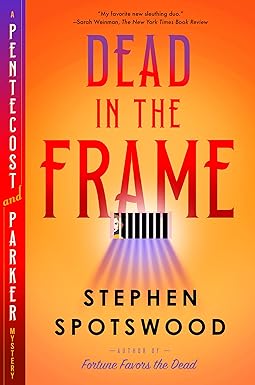
The fifth (and, as I type, most recent) book in Stephen Spotswood's "Pentecost and Parker" series. "Pentecost" is Lillian Pentecost, famed proprietor of her late 1940s New York City detective agency. And "Parker" is Willowjean, her diligent, wisecracking investigative assistant, who narrates most of the book. (There are some excerpts from Lillian's journal.) Two out of the five back cover blurbs make reference to the similar, obvious, precedent of Rex Stout's Nero Wolfe/Archie Godwin mysteries.
But this one moves off formula: an antagonist has been shot in the head at a shindig where he had promised to reveal a dark part of Lillian's family history to the world. Lillian arrives to confront him, and … bang, bang, he's dead, apparently shot by Lillian. Ballistics seem to point to her gun! Lillian is arrested, awaiting trial in the wretched "House of D" ladies' prison. To make it worse, one of the prison guards has it in for her.
So Willowjean is tasked with clearing her boss's name, finding the truth about what happened. It is a classically convoluted plot, with numerous possible suspects, each with possible motives. A lot of red herrings. Never fear, eventually the truth is uncovered, Lillian is cleared. This is a continuing series, after all; the outcome is never in doubt. And there's a setup for (I assume) book number six.
Trivia, not that it matters: I caught an anachronism at the start of chapter 38, where Willowjean's girlfriend, Holly, is "stubbing out her Chesterfield in the Folgers can." Ah, in 1947, that would have been a "Folger's can", with an apostrophe. The brand didn't lose its apostrophe until 1963 when acquired by Proctor & Gamble.
The mystery follows the "classic" formula in another way I've always found a tad irritating: Lillian and Willowjean figure out the true culprit, and accumulate supporting evidence, without telling the reader. Yes, this sets up for the Grand Reveal at Lillian's trial later. But this I-know-but-you-don't game kind of emphasizes the artificiality of the narration.
I also found it unfortunate that Spotswood saw fit to append a virtue-signalling "Author's Note" where he bemoans "a wave of laws passed across the country criminalizing gender and sexuality, and stripping women of their bodily autonomy." Sigh. Eye roll. Shut up and write.
![[The Blogger]](/ps/images/barred.jpg)



